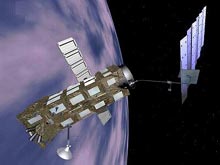ESA’s Envisat satellite ready for lift-off

Envisat is ready for launch <br>
During the night of 28 February/1 March, Envisat, ESA’s most powerful and sophisticated Earth observation satellite, will be launched by an Ariane 5 rocket from Europe’s spaceport in Kourou at 22:07 hrs Kourou time (02:07 hrs CET).
Built by a consortium of 50 companies led by Astrium, Envisat is the successor to ESA’s ERS satellites. With an array of ten instruments to monitor land, oceans, atmosphere and ice caps, it will provide the most complete set of observations ever achieved, to help scientists understand how changes affect our climate and answer questions such as: Is the ozone hole growing? What concentrations of greenhouse gases are to be found in the atmosphere? What is the state of the El Niño current? What is the state of the rain forest? How fast are ice caps melting?
Media representatives in Europe can follow the videotransmission of the launch at ESA/Darmstadt (ESOC) in Germany, which will be acting as the main European press centre, ESA/Noordwijk (ESTEC) in the Netherlands, ESA/Frascati (ESRIN) in Italy, ESA/Villafranca (VILSPA) in Spain, and Arianespace at Evry in France. At each site ESA specialists will be available for interviews.
Media representatives wishing to attend are requested to complete the reply form (see PR 7-2002) and fax it to the Communication Office at the establishment of their choice.
The ESA TV Service will provide comprehensive coverage of the launch, via satellite feeds. Details of the transmission schedule for the various Video News Releases can be found on http://television.esa.int
The launch can be followed live on the internet broadband at www.arianespace.com, starting at 01:45 hrs and lasting until 02:47 hrs.
Media Contact
All latest news from the category: Physics and Astronomy
This area deals with the fundamental laws and building blocks of nature and how they interact, the properties and the behavior of matter, and research into space and time and their structures.
innovations-report provides in-depth reports and articles on subjects such as astrophysics, laser technologies, nuclear, quantum, particle and solid-state physics, nanotechnologies, planetary research and findings (Mars, Venus) and developments related to the Hubble Telescope.
Newest articles

First-of-its-kind study uses remote sensing to monitor plastic debris in rivers and lakes
Remote sensing creates a cost-effective solution to monitoring plastic pollution. A first-of-its-kind study from researchers at the University of Minnesota Twin Cities shows how remote sensing can help monitor and…

Laser-based artificial neuron mimics nerve cell functions at lightning speed
With a processing speed a billion times faster than nature, chip-based laser neuron could help advance AI tasks such as pattern recognition and sequence prediction. Researchers have developed a laser-based…

Optimising the processing of plastic waste
Just one look in the yellow bin reveals a colourful jumble of different types of plastic. However, the purer and more uniform plastic waste is, the easier it is to…


